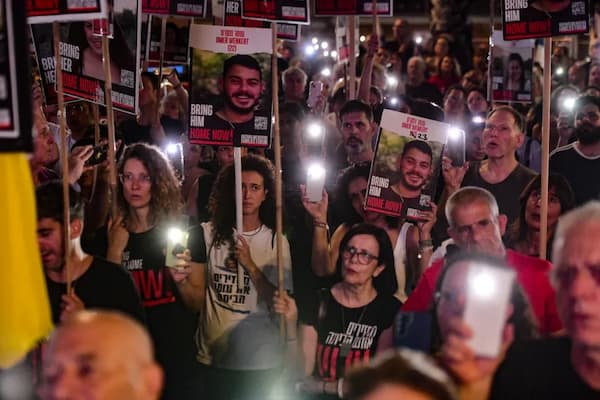It was never about the hostages.
Even thousands of Israelis appear to have been aware of that, as they marched en-masse once more against the Netanyahu-led government: and in this latest case, its failure to rescue six hostages, who were found dead on September 1st.
Israeli protests against the government’s lack of action for the various hostages still being held in Gaza may have spiralled last week, but they’ve been going on for months.
Many of those in Israel know what the rest of us sensed from the start: it’s not about the hostages.
The hostages are an inconvenience, if anything. A propaganda tool at best.
Witness the way some of the released hostages over the months have been reportedly treated by either the government or the media upon returning to Israel: in some cases having their testimony be discredited, or their voices muted.
Several instances have seen returned hostages expressing hostility towards the government and the Gaza operations, or in a few cases even expressing almost sympathetic feelings towards their captors.
The Danielle Aloni letter, which thanked her Hamas kidnappers for their kindness to her daughter, Emilia, aged 5, during their captivity, may easily be a fake crafted by Hamas: though even in Israel, its authenticity has been argued about.
Of course, other released hostages have given much bleaker accounts, saying they were badly treated, including some female hostages saying they were raped.
I don’t doubt some of these accounts are true. I’ve never defended Hamas or any extremist group.
But the point is that hostages coming home and speaking to the media can be a double-edged sword.
While having hostages die in Gaza isn’t good for the government, at least a dead hostage in Gaza can be used to evoke further ill feeling in the domestic population, which can be redirected to bolster the campaign of revenge: and also engender further sympathy abroad for Israel as the victim.
That same hostage alive and back home can say the wrong things. Which has happened a few times, including notably the elderly Yocheved Lifshitz back in the early weeks of the war, who’s hospital press conference after her release drew criticism from various Israelis for making her captors too sympathetic.
This was despite the fact that Lifshitz had also spoken of being beaten with sticks and had described the entire ordeal as hell.
Israel critics have possibly overstated the business of freed hostages expressing sympathetic thoughts abut their kidnappers. Most haven’t done that, and instead describe great trauma, as we would expect from victims of violent kidnap and captivity.
But that’s beside the point here.
In some instances, according to Hamas spokespersons, Israel even refused to take back hostages that the group tried to release. This was being reported as early as last October.
And as we covered here in October, what’s extraordinary is that even the aforementioned elderly peace activist Yocheved Lifshitz was allegedly rejected by Israel: and Hamas had to instead hand them over to the Red Cross in Egypt, from where they were transported eventually back in to Israel.
If the government wanted hostages safely returned to Israel, it would be negotiating meaningfully to arrange that. It has had eleven months to do that.
Hamas’s primary goal on October 7th was to acquire maximum hostages – to exchange in return for its own prisoners in Israeli jails. It’s obvious.
Israel could’ve secured the release of *all* the hostages by now. Indeed that option was on the table as long ago as October 29th last year.
But that’s not the agenda – the agenda is and was maximum destruction in Gaza, and the various other prefabricated agendas that October 7th facilitated.
Netanyahu has continuously rejected hostage deals and ceasefire packages, even when being pushed by allies such as President Biden.
And just last week, in the wake of the six murdered hostages, it emerged that the Jewish Chronicle in the UK was publishing fake stories to support Netanyahu’s justifications for avoiding reaching a deal.
In an interview last week with France 24, former Israeli PM Ehud Olmert made it simple, saying that Netanyahu “will not reach an agreement because he doesn’t want to bring back the hostages, because he wants to continue the war“.
This was the feeling as far back as last year, with NBC reporting, for example: ‘Netanyahu won’t agree to hostage release deal unless it polls well for him, Israeli families say they were told… “The Israeli government made a conscious and deliberate decision to sacrifice the hostages…”
These six hostages killed last week were reportedly executed by Hamas: though Hamas appears to refute the official story of how these people died.
Most observers seem to be accepting the IDF’s account that they were shot dead at close range by their captors when it was clear that Israeli forces were advancing into the area.
Nothing can justify those executions. Imagine the horror those people went through, facing such abject deaths after months of captivity.
But also imagine being held hostage in unsanitary underground spaces for *eleven months*, as bombs are being dropped all around you… and wondering why your government isn’t doing much to get you back home.
And, as much as Hamas might be justifiably painted as monsters for these deaths, it should be borne in mind that this appears to have been the last resort. Those hostages could’ve been negotiated for at any time in the last eleven months.
This is reinforced by videos released of the hostages shortly before their deaths, in which they appear to express their frustration with the Israeli government.
Of course, hostage videos need to be treated cautiously, as they could’ve been speaking under duress. But the sentiments are in-line with the growing feelings in Israel, at least among those protesting.
That sentiment being that the government has never prioritised the safety or return of the hostages.
And that hostages are in fact being sacrificed as pawns in service to the preexisting geopolitical agenda.
Let’s put aside the obvious: that the Israeli government allowed October 7th to happen deliberately, having ignored Intel and even specific warnings. Or that Israeli forces were themselves responsible for many of the Israeli deaths that day: which we’ve covered previously.
Even putting aside the relentless bombing of areas where Israeli hostages were known to be being held, incidents such as the IDF execution of three Israeli hostages in Gaza raise questions about where ‘accidents’ end and Hannibal Directive type operations begin.
There isn’t clear data on how many Israeli hostage deaths have been from the bombing: but Hamas has claimed on multiple occasions that hostages died from IDF bombs.
And this seems entirely likely.
Sheer logic dictates that the hostages were not taken alive into Gaza in order to be killed: since it would’ve been easier to massacre those people in the first instance.
While the blood of dead hostages is chiefly on the hands of their criminal captors for putting them in that situation in the first place, it’s fairly obvious that the Israeli government considers those people an acceptable loss.
The irony is that this is the same Israeli state who’s entire raison d’être has been creating a safe haven for Jews: and being the guardian of Jewish life.
And yet it allowed hundreds of its citizens to be attacked and killed on October 7th: in some cases, directly contributing to their deaths in places like Kibbutz Beeri and the Nova music festival.
And it has repeatedly refrained from arranging the release of hundreds of its own people from enemy territory: in some cases allowing them to die and in some cases killing them directly.
How any citizen of Israel can trust its government or institutions again is highly questionable.
But then Israel’s is hardly the only state in the world to make sacrificial lambs of its own people.





I love the way you focus extensively on the plight of the Israelis held in Gaza WITHOUT OFFERING A SINGLE WORD about the plight of the tens of thousands of Palestinians detained by Israel. Thousands without charge.
Not a word about the (at a minimum) dozens of deaths in custody in the past year, the well documented rape that was shown recently on Israeli tv. Not a word..
It reads as though you r research process consists of uncritically consuming the BBC and the Guardian and regurgitating everything they say. .
What happened to the person that wrote |the Libya Conspiracy”?
I’m sorry you’re not happy with the article.
But James, you’re making it sound like I’ve never talked about Gaza or the Palestinians. Or like I’m some Israel apologist. I’ve written here about the Oct.7th deception and the decimation of Gaza multiple times in the passed year.
Maybe I should’ve mentioned Palestinian prisoners or Israeli soldiers abusing prisoners: but this was an article about the Israeli hostages specifically. I’m not necessarily always going to mention every aspect of a subject when I’m focused on a specific element.
I also don’t feel there’s anything off about sympathising with Israeli hostages while also obviously being completely against Israel’s operations and the suffering of Palestinians, which obviously is far greater in scale: and which I’ve addressed countless times already.
I’m kind of baffled you would think I’m coming from some kind of pro Israeli angle.
What is the basis for your description of Hamas as an “extremist group|”?
The last time there were Palestinian elections, Hamas won. All of the Palestinian political factions advocate and participate in armed resistance. The only elements of Palestinian politics that do not support armed resistance are the Palestinian authority, so their involvement in armed actions does not make them an extremist party. so please share with us the basis for this classification.
As for Hamas as an extremist organisation: of course we could argue about it, depending on point of view. But I wouldn’t say it’s odd to regard hostage taking and possibly hostage execution as extremist acts – regardless of whether you support Hamas’s broader motives or political cause.
The IRA had a legitimate cause. But they could still be regarded an extremist group based on certain actions.
Didn’t Hamas execute some Palestinian political opponents in the past? And being democratically elected doesn’t mean you can’t be an extremist organisation: didn’t the Nazis win legit elections in the 1930s?
Hamas, I could add, was assisted into prominence by Israeli agencies as a preferred replacement for the PLO: and was rooted in the Muslim Brotherhood. We could also argue about whether the Muslim Brotherhood was extreme or not: we maybe have differing views on that.
I don’t know. I’m aware these are sensitive subjects – maybe even best avoided. I apologise if this piece was off the mark in your view.